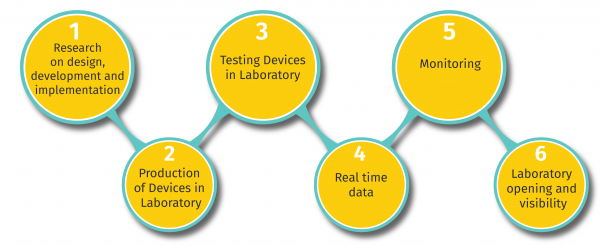
Research and education based on physical models of real engineering structures
It seems that some of the main problems in the field of scientific research dealing with engineering topics are the lack of adequate laboratory equipment, insufficient funding, industry scepticism about the variability of innovative ideas coming from academia and insufficient motivation of younger researchers to innovate. This project proposal suggests that the lack of expensive equipment can be compensated by conducting research activities with models. The motivating factor for young researchers will be the opportunity to deal with real problems, not theory, as well as participation in the creative process. The project aims to help change the focus from basic to applied research and to overcome industry scepticism towards commercializing the results by consulting with industry representatives and focusing on topics of interest to them.
In such an environment, younger associates would be encouraged to develop their areas of interest and their identity in the wider scientific community by conducting research initiated by the needs of the industry, using devices they have designed themselves. By initiating, promoting research and model-based education, the action should improve research capacity, motivate students and young researchers to choose engineering more often as an area of interest and help bridge the gap between the skills provided by education and the required skills in the labour market today. The published papers, as a result of the action, will advance the spread of the idea of model-based research and education as a way to overcome some of the major problems facing technical colleges. Setting up a laboratory and developing carefully structured procedures and plans for further development will become a permanent advantage of the Faculty of Polytechnics, while the results and opportunities for further cooperation will belong to all participants.
After first six months of project there have been conducted researches for two devices from four devices which are in the scope of the project. The first device is the device for determining the modulus of elasticity of steel and reinforced beam models. Second device is for determining the modulus in the areas of elastic and plastic deformations up to the breakage level of steel and reinforced beam models. For both devices there have been done several activates which consisted from: Analysis of the literature on theory; Methods and existing design solutions; Requirements analysis; Conceptual solution, theoretical analysis, numerical calculations and design optimization; Design and technical documentation; Selection of components.
The project that can be linked with this one is project “Laboratory for product design, including disciplines like graphic, interior and fashion design PRODE” implemented by UDG and sponsored as an innovative project by World Bank/HERIC in the period from 06/2014 to 06/2016. The main idea that lies behind the project is to enhance the performance of Montenegrin economy through creating an environment for technology transfer. The intention is to create and develop a prototype laboratory that will become a local and regional centre for creating and developing prototypes for various products, such as products made out of cardboard, plastic, textile, wood, stone and marble. This is the basis to the development of the project “Research and education based on physical models of real engineering structures”, especially in the field that includes laboratory examination since PRODE laboratory’s space at UDG will be used for the laboratory examination. The establishment of the laboratory and the development of carefully structured procedures and plans for further development are permanent asset of the Faculty of Polytechnics, while the results and the possibilities of different ways of collaboration belong to all stakeholders. Students’ competencies will be measured after the introduction of models into the programme of laboratory exercises, expecting that their improvement will be confirmed in practice, at their future work places.
With an experience in that area, project “Laboratory for product design, including disciplines like graphic, interior and fashion design PRODE” will significantly facilitate the implementation of the project “Research and education based on physical models of real engineering structures”. Having that on mind, it is clear that synergy and experience from PRODE project will result in broadening knowledge and expertise in implementation of “Research and education based on physical models of real engineering structures” project.